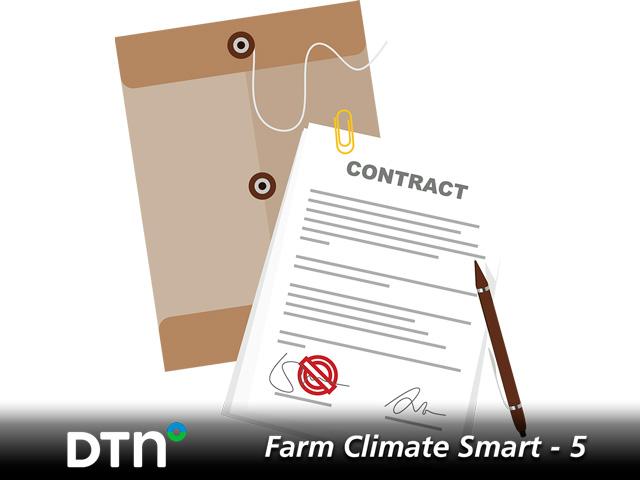Farm Climate Smart - 5
Seven Contract Considerations When Selling Carbon Credits
Farmers looking to sell carbon credits have a lot to think through. Dave Aiken, an agricultural law professor at the University of Nebraska Department of Agricultural Economics, said he's been fielding more questions from farmers looking into signing a carbon contract.
"They want to know which one is going to pay the most money and stuff like that. But there are also landlord/tenant issues that have come up," Aiken said. "I want them to better understand it's kind of the wild Wild West out there, and at the moment, it's not a stable market."
DTN/Progressive Farmer is continuing its special series of articles called Farm Climate Smart that examine what the term means, looks at current and future economic opportunities the movement offers for farmers and ranchers, and highlights what some producers are doing now to make their land and crops more resilient to a changing climate.
In the fourth article on Dec. 10, DTN looked at some of the major carbon programs already established (https://www.dtnpf.com/…).
In today's article, the fifth in the series, we delve further into contract considerations for farmers who want to sell carbon credits.
PROVIDING TRANSPARENCY
Trying to provide some principles for farmers and landowners, several carbon companies got together to create the Agricultural Climate Markets Collaborative. The goal was to provide more transparency so both farmers and carbon buyers can be more confident in the market.
A key point Aiken recommended is having an attorney go over the contract with you to understand all the details, "Because there is likely going to be some fine print, and if you just sign it so you could get the money, you could end up holding the bag."
Here are a few questions Aiken and the University of Illinois farmdoc economists recommended farmers consider before signing a carbon credits contract:
P[L1] D[0x0] M[300x250] OOP[F] ADUNIT[] T[]
1. How much will you get paid, and how will that payment come? Some companies are paying flat fees for conservation practices, while others are pegging prices of a credit to a metric ton of carbon.
2. How much is the company's cut per credit? If you are selling for $15 a ton, and the company is taking a 15% cut, then your payment is $12.75 a ton.
3. Does the payment move upward with the price of carbon, and if so, how is that price determined? Nobody wants to get locked in at $15 a ton if the price of carbon credits is going to move to $50 a ton.
4. How long are you locked in? Some companies are signing up farmers for just a year or two, while other buyers want to lock in a longer-term deal. Shorter terms make it easier down the line to potentially shift to a more profitable market, assuming you can provide some new additionality to your farm acreage.
5. What practices do you need to implement? Again, each company is different, but tillage practices, cover crops and fertilizer practices are often key considerations. Some programs could pay for retiring marginal lands, but would that be as beneficial as a Conservation Reserve Program contact?
6. Can farm tenants enroll in a contract? What happens if the land ownership changes? These are critical questions to understand concerning the length of a carbon program and who will be paid. Tenant and landowner need to be on the same page.
7. How much data needs to be reported? Who owns the data off the farm? Companies have specific software tools they want producers to use to measure the emissions from farming practices, carbon being sequestered and reductions in emissions over time. Companies also may want to send third-party verifiers to the farm. Farmers need to understand how much of their data will remain private and whether any of their information will be sold or shared.
**
This is the fifth story in DTN/Progressive Farmer's Farm Climate Smart series.
To see Farm Climate Smart - 1: https://www.dtnpf.com/…
To see Farm Climate Smart - 2:
To see Farm Climate Smart - 3:
To see Farm Climate Smart - 4:
To see a related blog, go to https://www.dtnpf.com/…
You can also hear a podcast about the series at https://www.dtnpf.com/… -- go to Field Post E124: Get Smart on Climate Smart.
Chris Clayton can be reached at Chris.Clayton@dtn.com
Follow him on Twitter @ChrisClaytonDTN
(c) Copyright 2022 DTN, LLC. All rights reserved.






